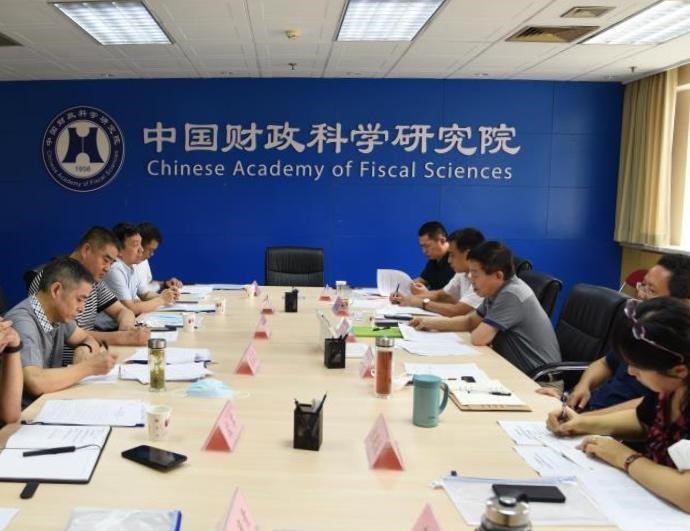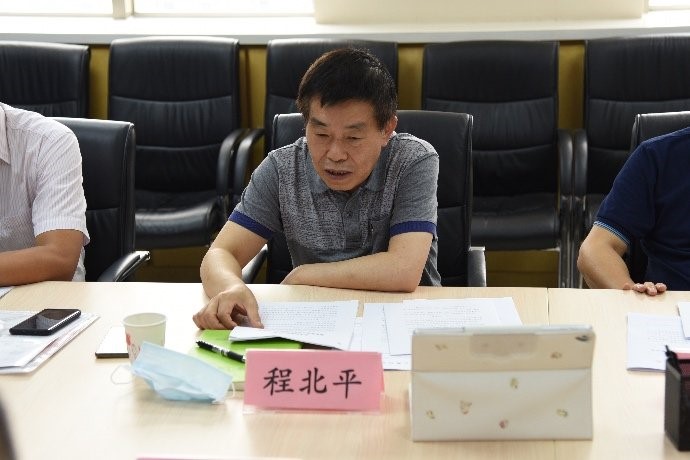[Report by Gao Chang, and Photo by Shi Baorong; CAMAA] On July 31, 2020, the Chinese Abacus and Mental Arithmetic Association (CAMAA) held an expert seminar on reform of the management of rating appraisal on abacus skill as well as abacus and mental arithmetic. At the seminar, the participants discussed the draft for comments and consultation on the measures for management of rating appraisal on abacus skill as well as abacus and mental arithmetic, the revision plan for the rating appraisal standard on abacus skill as well as abacus and mental arithmetic, etc. Cheng Beiping, Executive Vice Chairman of CAMAA presided over this meeting. Wang Weida (video) and Lu Ping (video), Vice Chairmen of CAMAA, Zhao Xiangyi, Secretary-General of CAMAA, Wen Zhifang, Ni Xiaojing, Chen Guozhong, Wang Shaochen (Deputy Secretary-Generals of CAMAA), Huang Wenkun, Executive President of the Abacus and Mental Arithmetic Institute, Chinese Academy of Fiscal Sciences, Xiao Jianhua, President of Guangdong Association of Abacus and Mental Arithmetic, Zuo Jun, Vice President of Beijing Association of Abacus and Mental Arithmetic, Wang Li (video), Secretary-General of the Abacus and Mental Arithmetic Association of Sichuan Province as well as the representative of some private member units attended this meeting.


The meeting pointed out many problems encountered in current appraisal management work: First, there is still a long way to form a unified market for appraisal work. The existing appraisal management system can’t meet the needs of the appraisal market, leading to frequent occurrence of disorder and confusion. Second, disordered management of appraisal standards and certificates. For example, the CAMAA didn’t implement sufficient regulation on the appraisal market. Some institutions and CAMAA branches went their own way and blindly pursued profits. Third, localized management arouse multiple contradictions. According to rough statistics, the amount of appraisals dominated by market forces currently accounts for about 80% of the total across China. This fundamental change in power structure posed tremendous pressure on localized management, while causing conflicts between local branches of abacus and mental arithmetic associations, private institutions as well as abacus and mental arithmetic associations at all levels.
As the meeting stressed, the reform is designed to form a unified and standardized appraisal market conducive to healthy and orderly development of abacus and mental arithmetic, and establish a public welfare and market-oriented appraisal system. (i) Adhere to public welfare orientation. The nature of CAMAA association as a non-profit social organization determines we should adhere to a public welfare orientation in the reform of our appraisal system. (ii) Adhere to the direction of market-oriented reform. The reform of the appraisal management system shall be carried out in line with market laws, and give full play to the role of market players.
The meeting suggested that, in the reform of appraisal system, we should strengthen unified management, and strive to ensure consistency between the standards, methods, specifications, processes, certificates, logos, software systems, charging standards, publicity planning, etc. We should use appraisal as a medium to establish a sound dishonesty punishment mechanism in the long term, actively introduce an integrity blacklist system, record those with serious violations and dishonesty on the “blacklist”, and adopt severe punishment measures. It’s necessary to establish a sound management system and operation mode. The practices and experience of many current reforms have shown that, we should basically follow the principle and practice that “separates regulation and organization” and use it as a valuable reference for our appraisal reform. We should establish a sound appraisal management system based on the re-division of responsibilities and rights and the principle of unifying responsibilities and rights; and grasp the opportunity of introducing the third parties to establish a perfect appraisal operation mode in accordance with the market-oriented direction and principles. We should properly cope with the relationship between the responsibilities, rights and interests of all parties involved. The participating experts also conducted discussions on the appraisal charging standards, appraisal institutions, voluntary principle, appraisal regulation, etc., and put forward constructive suggestions.
According to the meeting, the reform of the appraisal system should stick to the unified leadership of CAMAA, give full play to the initiative and enthusiasm of CAMAA branches at the provincial level, actively mobilize the initiative and creativity of market players, adhere to the problem orientation, identify the main contradictions and problems, do a good job in top-level design and overall planning, and carry out various work in an organized manner step by step.


